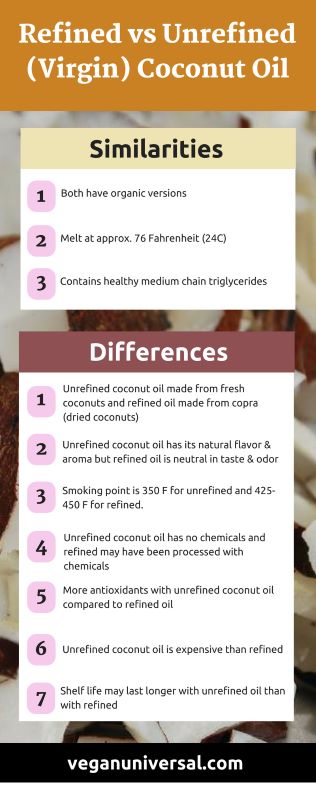 We all know how coconut oil can be healthy, natural and versatile be it for cooking, skin & hair or for many other uses. It is also a great vegan and dairy-free substitute for butter.
We all know how coconut oil can be healthy, natural and versatile be it for cooking, skin & hair or for many other uses. It is also a great vegan and dairy-free substitute for butter.
However, many may not know the distinction between various types of coconut oils and we believe it is valuable to know these differences as there could many unhealthy, over processed coconut oil brands out there.
In the world of coconut oils, unrefined and refined are the two main types, but there are sub-varieties as well which you will know with this post.
The variation would depend on the type of coconuts sourced, extraction & processing methods.
These changes could result in taste, odor, smoke point, price, availability, shelf life and some health benefits as well.
Now that you know they’re not created equal, let’s make a thorough comparison of the two types of coconut oil which are mostly available in the market.
How They’re Made & Buying Guide (Refined vs Unrefined)
Unrefined Coconut Oil
Unrefined coconut oil is also known as virgin, extra virgin, or pure for good reasons and is made from fresh coconuts and not from dried copra.
This method of sourcing makes unrefined coconut oil free of impurities and cleaner compared to sun-dried copra.
With no refining process, no heavy oxidation, and no chemicals used, the natural compounds are well preserved with unrefined virgin coconut oil.
It can be extracted by natural or mechanical means, with or without the use of heat and using dry or wet methods.
Most unrefined commercial coconut oils on the market would have used the dry & expeller pressed methods to extract coconut oil which involve more heat than the cold-pressed method of extraction with minimum heat.
In the case of cold-pressed method, the coconut milk is pressed out of the coconut meat and the processing never exceeds 120 degrees Fahrenheit (49 Celsius) which is done in a heat-controlled environment. This produces a more pure, superior oil, which is higher in potency.
Whereas with expeller-pressed coconut oil there is a lot of pressure and friction involved which result in higher temperatures that could go up to 210 degrees Fahrenheit (99 Celsius).
Quality virgin coconut oil should be colorless with no sediment and has its natural coconut taste & aroma.
Compared to olive oil there is no difference in “virgin” or “extra virgin” with regard to the quality of coconut oil.
When buying unrefined coconut oil, we prefer to choose organic virgin cold-pressed coconut oil.
Refined Coconut Oil
Unlike with unrefined coconut oil, refined coconut oil is made with dried copra, not from the fresh kernel. Copra can be made with sun drying, smoke drying, kiln drying, hybrid solar drying or with a combination of these methods.
Since the methods of drying copra are not dirt-free the oil extracted should be purified & refined for human consumption.
There are two main ways the oil is commercially refined. It could be either expeller-pressed and distilled using steam or use heated hydraulic press & chemical solvents to extract and refine.
The latter method provides higher yields and is faster & cheaper to produce. Coconut oil refined with this method is called RBD oil (refined, bleached, and deodorized).
Some refined coconut oils are hydrogenated or partially-hydrogenated that could have trans-fats which are unhealthy. You may find this type of coconut oil mostly used by bakeries and restaurants.
Therefore when choosing a refined coconut oil we opt for non-hydrogenated organic coconut oil that is steam refined and chemical-free (if you can’t find details on the label you can check the manufacturer’s website)
Note:
If it’s certified organic the oil is sourced from certified organic coconuts which have not been treated with chemicals or fertilizers.
Choose coconut oil that comes in glass jars or BPA-free containers.
Impact on Health
If we consider the two varieties of unrefined coconut oil, the loss of nutrients is marginal with expeller-pressed compared to cold-pressed oil which could be slightly higher in phenolic and other antioxidant properties.
Comparing the refined and unrefined coconut oils, the medium chain fatty acids (MCFAs) which is 60% of total fatty acid composition remain stable and almost the same.
The medium chain fatty acids are a quick source of energy or turned into ketones by the liver. This metabolic effect of medium chain fatty acids has shown to help reduce weight and the ketones have been assumed to provide an alternative energy source to brain and result in better brain function.
Having said that, unrefined coconut oil could have more phytonutrients (protective plant chemicals) and can be expected to be slightly richer in polyphenols, vitamins, and minerals while having no trans fats.
Polyphenols can play a role in cardio health, anti-aging, anti-inflammation, and reducing the risk of diabetes, cancer and neurodegenerative diseases.
If the refined coconut oil is chemically processed, it may lose antioxidants such as polyphenols and hydrogenated or partially-hydrogenated refined oils could produce trans-fats which are unhealthy.
Price & Availability
As refined coconut oil is cheaper than virgin coconut oil which results in higher demand due to its low price means you will generally find more refined coconut oil brands on the market.
Product Life
There are three elements that can help you decide the shelf life. The processing method used to obtain the oil, how you store it, and the expiry date (best by date) given by the manufacturer.
Cold-pressed or no heat processing methods of coconut oil will experience the lowest amount of oxidation which would have the longest shelf life whereas expeller-pressed coconut oil will be exposed to high temperatures.
In contrast, refined coconut oil would have the highest amount of oxidation due to high heat exposure and if refined with chemical solvents that too would damage its antioxidants.
Unrefined coconut oil not being affected by high heat or chemicals means it is the purest form and should have 3-5 years of shelf life if stored in a cool, dry place with a tightly sealed container.
Refined coconut oil should last 18 months without going rancid and when stored properly may even last 2-3 months past the expiry date. Always check for any signs of spoilage in case if you’re using after the expiry date.
For Cooking
 So which coconut oil is best for cooking? Before we find the answer, let’s check the varying smoke points and tastes of these two coconut oils.
So which coconut oil is best for cooking? Before we find the answer, let’s check the varying smoke points and tastes of these two coconut oils.
As you know coconut oil is such a versatile oil and that means you could find a way to use it every day with many meals for loads of recipes and dishes.
Smoke Point
- Unrefined virgin coconut oil: 350 degrees F (176 Celsius)
- Refined coconut oil: 425-450 degrees F (218 Celsius)
Taste
A very light and subtle coconut flavor & aroma are associated with cold-pressed virgin coconut oil, whereas with expeller-pressed unrefined coconut oil you would get a more nutty, toasted flavor. Both of these versions would still retain coconut oil’s natural taste as they’re not refined.
When it comes to refined coconut oil, it has basically a neutral flavor and therefore tasteless.
You may use cold-press coconut oil for recipes that call for a mild coconut flavor and use expeller-pressed version for baking and recipes that require a nutty and toasted flavor.
Just remember that virgin coconut oil has relatively a low smoking point than refined oil, hence it’s useful when you’re doing medium-heat sautéing, baking or using it for salad dressings, smoothies, oatmeal, coffee, popcorn, soups, and to make coconut butter, and egg-free vegan mayonnaise.
Refined coconut oil is ideal for high heat cooking and when you don’t want coconut flavor to influence your recipes. You may use refined coconut oil for stir-frying, tempering, deep frying and for any stovetop cooking as required.
For Skin & Hair (Refined or Unrefined?)
Coconut oil can be such a soothing, natural & nourishing beauty treatment! People from coconut-rich countries have used it for thousands of years and today it’s used as a hair conditioner, moisturizer, massage oil and for many other beauty care applications.
The best coconut oil we prefer for skin & hair care is organic virgin cold-pressed coconut oil since its nutrient profile is undamaged which has all the antioxidants coconut oil suppose to deliver. But it is slightly expensive and comes with its natural odor.
In case you’re tight with your budget or need an option without any smell use a quality refined coconut oil. Just make sure it’s not processed with chemicals and go for options like organic, expeller-pressed and steam refined.
Summary of Similarities & Differences
Similarities
- Both have organic versions
- Melt at approx. 76 Fahrenheit (24C)
- Contains healthy MCTs (medium chain triglycerides)
Differences
- Unrefined coconut oil made from fresh coconuts and refined oil made from copra (dried coconuts)
- Unrefined coconut oil has its natural flavor & aroma but refined oil is neutral in taste & odor
- Smoking point is 350 F for unrefined and 425-450 F for refined.
- Unrefined has no chemicals and refined may have been processed with chemicals
- More antioxidants with unrefined oil compared to refined oil
- Unrefined oil is expensive than refined
- Shelf life may last longer with unrefined oil than with refined

Reference:
Coconut-Oil-What-is-it-All-About_eatright.org_07_2013 pdf
Related Posts:
- Coconut Oil Health Benefits, Skin & Hair Uses and Side Effects
- Best Coconut Oil Brands For Cooking
- Coconut Meat Nutrition, Health Benefits, and Side Effects
- Like
- Digg
- Del
- Tumblr
- VKontakte
- Buffer
- Love This
- Odnoklassniki
- Meneame
- Blogger
- Amazon
- Yahoo Mail
- Gmail
- AOL
- Newsvine
- HackerNews
- Evernote
- MySpace
- Mail.ru
- Viadeo
- Line
- Comments
- Yummly
- SMS
- Viber
- Telegram
- Subscribe
- Skype
- Facebook Messenger
- Kakao
- LiveJournal
- Yammer
- Edgar
- Fintel
- Mix
- Instapaper
- Copy Link
Get free updates on vegan articles, news, recipes, and much more...


Leave a Reply